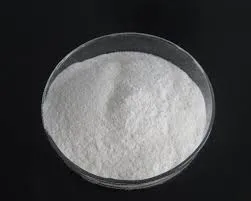
Oct . 14, 2024 11:03 Back to list
Exploring the Applications and Benefits of Hydroxyethyl Cellulose in Various Industries
Understanding Ashland Hydroxyethyl Cellulose Applications and Benefits
Hydroxyethyl cellulose (HEC) is a water-soluble polymer derived from cellulose, an abundant natural polymer found in plant cell walls. Among the various manufacturers of HEC, Ashland Global Holdings Inc. has established itself as a leading supplier in the market. This versatile polymer has gained significant attention in various industries due to its unique characteristics and applications, particularly in the fields of pharmaceuticals, cosmetics, and construction.
What is Ashland Hydroxyethyl Cellulose?
Ashland hydroxyethyl cellulose is produced through the etherification of cellulose, which enhances its solubility and modifies its physical properties. This process not only maintains the inherent features of cellulose but also introduces new ones, such as thickening, gelling, and film-forming capabilities. Ashland’s HEC is known for its high purity and consistent quality, making it a preferred choice for manufacturers globally.
The polymer is available in various grades, allowing for tailored formulation according to specific applications. Its properties can vary based on molecular weight and substitution degree, which impacts viscosity, solubility, and other functional characteristics. This versatility makes Ashland HEC suitable for a wide range of products, from personal care items to industrial applications.
Applications of Ashland Hydroxyethyl Cellulose
1. Pharmaceuticals In the pharmaceutical industry, Ashland HEC is primarily used as a thickener and stabilizer in topical formulations. Its ability to improve the texture and viscosity of creams and gels enhances the efficacy of active ingredients. Additionally, HEC serves as a binder in tablet formulations, ensuring uniform distribution of components and enhancing the mechanical strength of the tablets. Its biocompatibility and non-toxic nature make it an ideal choice for various medical applications.
2. Cosmetics The cosmetics industry benefits significantly from Ashland HEC, where it serves as a thickening agent, emulsifier, and film former in products such as lotions, shampoos, and make-up. It imparts a smooth feel and enhances the sensory experience of application. Furthermore, HEC helps to stabilize emulsions, preventing the separation of oil and water phases, which is crucial for ensuring product consistency and performance.
ashland hydroxyethyl cellulose

3. Construction In the construction sector, Ashland hydroxyethyl cellulose is utilized as an additive in cement-based formulations. Its inclusion improves the workability and adhesion of mortars and plasters, making it easier to handle and apply. The water retention properties of HEC help to enhance the curing process, ensuring that the materials maintain adequate moisture during the drying period. This results in improved strength and durability of the finished product.
4. Food Industry While not as widely known for it, HEC also finds application in the food industry as a thickening agent and stabilizer in sauces, dressings, and dairy products. It can improve texture and mouthfeel, providing a desirable viscosity without affecting the flavor of the food.
Advantages of Ashland Hydroxyethyl Cellulose
The advantages of utilizing Ashland HEC are manifold. Firstly, its non-toxic and biodegradable nature makes it an environmentally friendly option, aligning with the growing demand for sustainable materials. Secondly, its excellent solubility in cold water allows for easy formulation, eliminating the need for heating, which can degrade other types of thickeners.
Moreover, Ashland’s commitment to quality ensures consistent performance across different batches. This reliability is crucial for manufacturers who need to maintain product standards. Additionally, the ability to customize HEC grades to meet specific application needs provides flexibility and innovation opportunities for formulators.
Conclusion
In summary, Ashland hydroxyethyl cellulose stands out as a multifunctional ingredient with broad applications across various industries. Its properties of solubility, thickening, and emulsification contribute significantly to the performance and quality of products ranging from pharmaceuticals to cosmetics and construction materials. As the demand for high-quality, sustainable ingredients continues to rise, the relevance of Ashland HEC in enhancing product formulation and functionality will likely grow, solidifying its position as a crucial component in modern industries.
-
Versatile Hpmc Uses in Different Industries
NewsJun.19,2025
-
Redispersible Powder's Role in Enhancing Durability of Construction Products
NewsJun.19,2025
-
Hydroxyethyl Cellulose Applications Driving Green Industrial Processes
NewsJun.19,2025
-
Exploring Different Redispersible Polymer Powder
NewsJun.19,2025
-
Choosing the Right Mortar Bonding Agent
NewsJun.19,2025
-
Applications and Significance of China Hpmc in Modern Industries
NewsJun.19,2025







